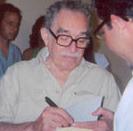Considered by many to be the greatest Latin American author, Gabriel GarcÃÂa Márquez encompasses the imagination of peasant settlers and the talent of nomadic gypsies in his writing. Most famous for his celebrated epic novel One Hundred Years of Solitude, this Colombian Nobel Prize winner is the father of a new literary genre called magical realism. With a touch of authenticity and a hint of fantasy, he creates a masterpiece. GarcÃÂa Márquez's contribution to the literary world distinguishes him as a subject noteworthy of study, for his work raises important questions of time and reality.
By setting the standard for magical realism, GarcÃÂa Márquez prompts the reader to question what is real and what is unreal. In his work, he implies that our conception of reality is tainted by pragmatism and that reality is a far cry from rationality. With a mixture of politics and superstition, GarcÃÂa Márquez combines the actuality of journalism and the gist of folktale to set the tone for his writing.
He confirms:
The tone that I eventually used in "One Hundred Years of Solitude" was based on the way my grandmother used to tell stories. She told things that sounded supernatural and fantastic, but she told them with complete naturalness... What was most important was the expression she had on her face. She did not change her expression at all when telling her stories and everyone was surprised. In previous attempts to write, I tried to tell the story without believing in it. I discovered that what I had to do was believe in them myself and write them with the same expression which my grandmother told them: with a brick face.
This technique is effective because it annihilates the distinction between the real and the fantastic, causing the reader to reconsider their perspectives on...


